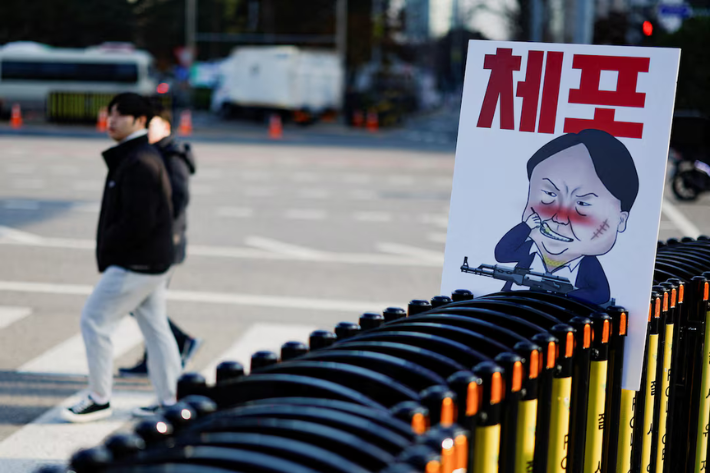A botched bid to impose martial law — that lasted a mere six hours — is continuing to cause chaos in South Korea, with confusion surrounding who is actually in-charge of Asia’s fourth-largest economy.
While life largely went on without disturbance for South Koreans on Monday, behind the scenes, a cloud of doubt loomed over many things — from governance, trade and diplomacy to markets and budgets.
The benchmark Kospi index closed down 2.8%, while the smaller Kosdaq index dropped more than 5%. The won weakened almost 1% against the dollar, hovering at levels last seen on Tuesday night when President Yoon Suk Yeol declared martial law.
Also on AF: Top Korea Leader Thought Martial Law Declaration Was Deepfake
Meanwhile, key ministers, including the interior and defence ministers, resigned and many agencies were in crisis control mode.
Opposition leader Lee Jae-myung said on Monday the political crisis threatened to cause irreversible harm to one of the world’s biggest suppliers of memory chips.
In order to sustain the country’s semiconductor and export competitiveness, normal diplomacy must be supported, he said.
“Diplomacy is in a state of complete paralysis,” he told reporters. “If President Yoon does not resign immediately, it will cause irreparable damage to the exchange rate, the stock market, and the national competitiveness of the Republic of Korea.”
Foreign Minister Cho Tae-yul warned South Korea must be unremitting in its efforts to restore the trust of its partners and once again measure up to the expectations of the international community.
”While this may take time, we must be steadfast and earnest as we devote our diplomatic efforts to rebuilding trust,” he said.
Who’s in charge?
The biggest question looming over the country right now is: Who is governing South Korea?
On Saturday, Yoon returned to South Korean televisions to deliver a terse apology. He said the decision to impose martial law “was born out of desperation” and went on dispel rumours he would seek to impose martial law again.
“Let me be clear: There will never be a second martial law,” Yoon said.
Shortly after, the president survived his first impeachment vote after members of his People Power party (PPP) boycotted the vote.
Then, on Sunday, local news agency Yonhap reported that Yoon was under criminal investigation for alleged treason. Later PPP leader Han Dong-hoon said the president would be excluded from handling foreign and other state affairs, saying that Prime Minister Han Duck-soo would manage government affairs.
That proposal has drawn criticism from the opposition, which say it is unconstitutional as Yoon must be impeached or resign and face legal prosecution.
Opposition parties say they will continue to file an impeachment motion every week until Yoon resigns or is removed, according to a report by the Financial Times. Yoon has refused calls, including some from within his own ruling party, to resign.
Meanwhile, on Monday, officials said Yoon has also been banned from leaving the country, while also saying he was still legally commander in chief.
That has caused complete confusion about South Korea’s current state of governance.
“We have a situation where the president cannot make decisions, he cannot give guidelines, he cannot give orders,” Kang Won-taek, a professor of political science at Seoul National University, told the New York Times.
“Although we have a president, we are in a state of anarchy.”
Trump uncertainty
The political upheaval comes at an especially critical time for South Korea, considering it navigates an uncertain future with its ally the United States.
Former trade minister Yeo Han-koo, who previously worked with the Trump and Biden administrations, said he was worried about a power vacuum in South Korea at a time when the presidential office and government should be working with industries to prepare responses to President-elect Donald Trump’s plans, which will directly impact Korea’s export-reliant economy and companies, including chipmakers and battery makers.
“Considering the tariff disruption expected under the Trump administration, strong government leadership and bold policy action are needed,” he said. “But Korea is in turmoil.”
South Korea also faced political upheaval with the impeachment and removal of then-President Park Geun-hye in a corruption scandal in 2016 and 2017 just as Trump was elected the first time, but the current chaos is worse, Yeo said.
“The uncertainty is a huge distraction,” he said.
- Reuters, with additional editing and inputs from Vishakha Saxena
Also read:
US Pressing Korean Chipmakers For More China Chip Curbs
China Welcomes ‘New Beginning’ Of Ties with Korea, Japan
South Korea to Announce $7 Billion Package For Chip Industry
US to ‘Indefinitely Extend’ China Chip Waivers For South Korea
Competition in Chip Industry an ‘All-Out War’, South Korea Says
Another Chip Shortage Looms as AI Frenzy, Climate Change Bite
























